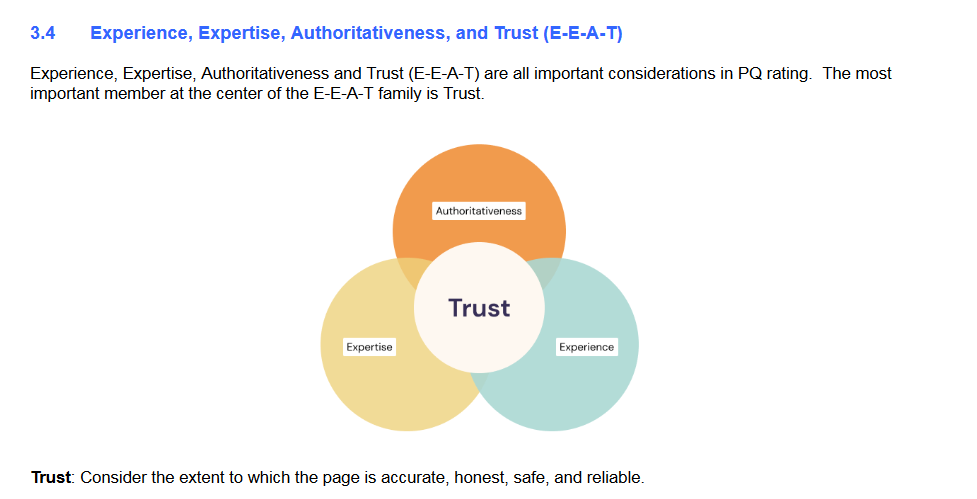What is E-E-A-T, and Why Does it Matter?
EEAT (formally “EAT”) stands for Experience, Expertise, Authoritativeness, and Trustworthiness. These 4 items are a crucial part of Google's Search Quality Rater Guidelines. This is something that is used by real people to inspect the quality of Google search results. With the increasing amounts of spam and low quality AI Generated content being put out into the internet, it's important that google tries to find trustworthy sources that will provide their users with content that is accurate, honest, safe, and reliable. This is an SEO concept that you can easily integrate into your Sitecore/XM Cloud website!
Google and other search engines use these factors to validate the credibility of content. While everyone benefits from improving their EEAT, it has a more significant impact on Your Money, Your Life (YMYL) topics. YMYL topics such as Health, Finance, Civics, News, and Shopping are heavily influenced by their EEAT rating. If we compare two Health blogs:
- A Sitecore blog with a strong EEAT showcases not only the accuracy of its content but also the fact that it is reviewed in-house by a contracted doctor before publishing, resulting in a high EEAT score.
- A Sitecore blog with a weak EEAT that struggles to showcase the validity of its content and has a low EEAT score.
If both blogs have the same content, you will notice that Blog 1 with a high EEAT score constantly outranks Blog 2 on all topics, as expected. But Blog 2 could have significantly better, higher quality content that goes more in-depth into the reasons why, and is overall more useful to the user - and Blog 1 will still have a higher chance of outranking Blog 2. Sitecore allows you to easily reference Author data on your content which will allow you to easily improve your EEAT.
EEAT is a very important factor in helping search engines understand that you have high-quality and trustworthy content. While Google has said that EEAT isn't a direct ranking factor in its algorithm, it's important to remember that Google wants to provide its users with the best content possible, and EEAT is directly used by Google's Quality Evaluators.

Table of Contents
- Experience (E)
- Expertise (E)
- Authoritativeness (A)
- Trustworthiness (T)
- Final Thoughts On EEAT & Sitecore
Experience (E)
What is “Experience” (E)?
The first “E” is for “Experience”. Quality content will come from people who have direct experience with the topic they are writing about. This has also been prevalent in Google’s recent Product Review algorithm updates. Those updates were focused on targeting fraudulent product reviews and had a huge impact on affiliate review websites. It reduced the amount of spam/regurgitated reviews that were stolen from other websites. “Experience” was added to EEAT to help tackle similar issues and is relevant in all industries, not just “Product Reviews”.
With the recent rise of AI tools like ChatGPT and Google Gemini, the amount of low quality content has increased significantly; being able to provide “experienced” writers for your content tells google you know what you are writing about. Here is a table of data from Google explaining examples of Experience vs Expertise.
| YMYL Topics | Valuable sharing of life Experience | Information or advice best left to Experts |
|---|---|---|
| Sleep challenges when pregnant (YMYL Health or Safety) |
Safe and nonmedical tips and tricks for sleeping in the last trimester of pregnancy, provided by people who have personally struggled with this challenge. For example: How to use pillows to sleep comfortably in a position that is safe for babies |
Sleep medications that are safe during pregnancy |
| Liver cancer treatment (YMYL Health or Safety) |
A sincere and respectful forum discussion where people are describing how they're coping with liver cancer treatment | Different treatment options for liver cancer and the associated life expectancies under each treatment |
| Filling out tax forms (YMYL Financial Security) |
A humorous video from a non-expert content creator about the frustration of doing taxes | Instructions on how to fill out tax forms |
| Saving for retirement (YMYL Financial Security) |
Reviews of retirement saving services by people with first-hand experience using these services | Advice on how to invest for retirement: - How much to save - What kinds of assets to invest in - How much money you will need to retire by a specific age - How much money you will need to retire by a specific age - etc... |
| How to vote (YMTL Society) |
A social media post by an ordinary citizen describing why they personally believe it's important to vote in local elections | Information about who is eligible to vote or how to register to vote |
Table Source: Googles Search Quality Evaluator Guidelines PDF - Section 3.4.1
How to Showcase “Experience” in Sitecore
There are many ways to showcase an author's experience. Some of the most effective methods include having content writers create content that deliberately highlights their experience, and utilizing Schema to showcase this data to Google (Schema being a strong recurring theme for improving EEAT).
Example:
Imagine an author named John who writes extensively about his experience playing badminton. He shares articles about things his coach has taught him, how he realized the situations to use different strokes, etc… Articles like these showcase his years of experience playing badminton.
Now imagine John writes an article reviewing badminton racquets, not only can readers see John is an experienced badminton player, but Google can also recognize John as an experienced player which provides Google more confidence in John’s article.
Showcasing Experience is important; however, the most crucial aspect is having a location that ties all your changes together: Author Bio pages. While you might initially think these are insignificant, they are a great way for Google to identify which pieces of content your authors have written. By linking to the author bio on each article, Google can discover all the content that the writer has contributed within 2 to 3 link clicks. Bio pages are extremely helpful, and I will cover how to improve them for each part of EEAT; luckily you can store all you're author information in the author item inside your Sitecore instance, making it super easy to present this data to your readers.
Cheat Sheet - Important parts of Experience are:
- Create “Author Bio” pages
- Try to have more than one individual piece of content on each topic
- Cluster your authors into specific topics
- Highlighting your Experience with more than just written content (ex: videos, images, PDFs, etc…)
Expertise (E)
What is “Expertise” (E)?
The second "E" in EEAT stands for Expertise. Expertise is similar to "Experience" but emphasizes that an author is a professional in a specific field. Specifically, Google defines Expertise as someone who not only has the knowledge, but also the qualifications and credentials to provide reliable information in a field or subject. Expertise and Experience are closely related.
For topics like finance and medicine, expertise is the most important area of EEAT. Google puts a lot of focus on providing people with accurate and valid information that is already generally accepted in the given field. An author's education, academic accomplishments, and general professional success provide the immediate support needed to improve an author’s expertise. While keeping that in mind, expertise doesn't always require academic support. For many topics, general everyday experience can also contribute to expertise. For example, John from the “Experience” badminton example could be classified as having expertise. Home cooks are another common example given when talking about non-professional expertise.
How to Showcase “Expertise” in Sitecore
Similar to “Experience”, there are many ways to showcase your author’s expertise; however, the most important difference is ensuring the person writing the content is an expert on the subject, and you clearly state that to Google. If you want to create content on a topic you are not a defined expert in, you should collaborate on the article with someone who is.
The optimal way to approach this is to have your designated expert write the entire article for you. Sadly, not every expert has the time/desire to write articles, plus it can accumulate a large content bill if you are having all of your content written directly by professionals. The best solution to this is to have someone who is adept at writing author the article, and then getting a professional to review it. This way, you can still link the content to the expert, and proudly state “Reviewed By: Dr. John Doe”.
Once you have your content reviewed by an acclaimed professional, it's important to highlight that to both your readers and Google. In most cases, simply putting their name on the article isn't enough. You should add a Person Schema for your professional and ensure that you link out to a dedicated author page. Utilizing schema is extremely important in showcasing expertise, and you should aim to include as much information as possible. This will help Google link your content directly to the professional. The sameAs value is extremely important; it will allow you to connect your professional to other pages that will help Google understand who they are. Example links could be: social media platforms like X (formerly Twitter), and bio pages. You could also add a toggle in Sitecore that adds an “expert” tag to select authors that have unique qualifications, then display this on your pages. The more famous your professional, the more established they are in the space, which can have a huge effect on not only your expertise but also your authority.
Cheat Sheet - Important parts of Expertise are:
- Add more details to your “Author Bio” pages
- Including detailed information about the author's qualification details, career information, etc…
- An in-depth bio talking (and linking) about their relevant qualifications.
- You should list qualifications where ever the author is mentioned on your article. (About the author, Reviewed by, etc…)
- Ex: An accountant has “CPA” listed under their name.
- A fully fleshed out Person Schema
- Both on the article page, and on the author bio page
Authoritativeness (A)
What is “Authoritativeness” (A)?
The “A” in EEAT is for Authoritativeness, or more plainly, content authority. Authoritativeness relies more on the website's reputation as a whole, compared to the individual expertise and experience of the authors as seen in “Expertise” and “Experience”. If you are a go-to source of information for your niche, then chances are high that you will have a high authority score. Popular sites with a strong authority would be: The Wall Street Journal (Finance and Economics), National Geographic (Science and Exploration), Harvard Business Review (Business and Management).
How to Showcase “Authoritativeness” in Sitecore
Since Authoritativeness is on a much broader scale than “Expertise” and “Experience”, it can be much harder to increase your Authority rating. The most important ways to increase your authority are by earning backlinks from other sites in your semi-adjacent niche that already have a high authority, and creating a strong content silo for an entire topic that helps define you as a topical authority.
Building backlinks from an average site can be extremely difficult, never mind trying to get one from high authority sites like WSJ. There are two main categories for obtaining backlinks: getting them organically versus asking for backlinks directly.
Obtaining organic backlinks requires you to build content that people will naturally want to link to. You want to think about providing people with something unique that can only come from you. Polling your audience and putting out a press release about your findings is a great way to obtain backlinks naturally. You can even send out your press release to related websites to try to entice them to write content about your findings (the juicier the topic, the better).
Asking for backlinks directly is difficult and requires sending many emails to numerous websites in the hope that they don't just disregard you as spam. On top of this, websites can ask you to pay to have your website linked to, and authoritative websites have been known to charge upwards of $500 per link. However, not every website is going to require you to pay for a backlink. If you want to ask directly, the main methods are: Link Insertion (asking to insert or replace a link inside an existing article), and Content Creation (offering to create a completely new article for free). Generally, asking directly has a low success rate.
Becoming a topical authority is another way to build your authoritativeness. Each time you become a go-to resource on a topic within your niche, your authority increases. The easiest way to do this is by creating a strong content strategy for each topic in your industry. Try starting from a unique place that lacks an abundance of content. These locations might have a low monthly search count, but they will help contribute to your overall authority and will be much easier to rank for, since none of the bigger sites in your niche are targeting them.
A common content strategy to build topical authority, that will be easy to implement into Sitecore, is using Content Silos. The idea is to create a 'silo' structure for your content, grouping all of your related content together with internal linking and keywords. First, choose a primary topic, then create sub-topics that relate back to your primary topic. For example, you could have a silo for “Travel Photography”. Your sub-topics could be: Essential Gear, Composition and Framing, Lighting and Time of Day, Editing and Post-Processing, Capturing Local Culture. Each of your subtopics can have multiple articles that all link to each other. Semrush has a great article on Content Silos and compares them to another common strategy: “Topic Clusters”.
Cheat Sheet - Important parts of “Authoritativeness” are:
- Earning strong backlinks from pre-established authoritative websites
- The closer to your niche, the better
- Build a content strategy that will allow you to become a topical authority on a subject.
- Common strategies are using Content Silos or Topic Clusters.
- Follow Stanford’s Web Credibility Guidelines
- Create a strong personal brand
- This also includes working with Authors who have an already established personal brand
Trustworthiness (T)
What is “Trustworthiness” (T)?
The final letter in EEAT is for Trustworthiness. Trustworthiness is focused on assessing the overall level of accuracy, honesty, safety, and reliability of your website. It's all about being transparent: who is writing your content, has the content been reviewed, do you cite trustworthy sources? Don't undersell Trustworthiness; Google has made it clear that this is the most important part of EEAT. Trust is what ties everything together. This is a direct quote from Google's Quality Rater Guidelines:
“The most important member at the center of the E-E-A-T family is Trust”
How to Showcase “Trustworthiness” in Sitecore
If you do a good job of showcasing Experience, Expertise, & Authoritativeness, you're already well on your way to having strong Trustworthiness. However, there are some unique aspects that can really help improve your Trustworthiness. One example stated directly by Google is that your website must use HTTPS. Another Example for an e-commerce site, capturing honest online reviews can have a big impact on your website's trust. Obtaining a steady stream of positive reviews helps show Google that your site isn't spam and provides good products. E-commerce sites should also have an easy way for users to find your refund/returns policy.
Another important aspect is ensuring that you're publishing accurate and updated information in your articles/blogs. Going back and updating an old blog when something critical changes is a good example of this. Additionally, you should cite, link, and reference any credible websites in your content that are also trustworthy! You could add a custom field in Sitecore that you can store all your citations in, allowing for an easy way to display them on the front end to your readers!
Google has stated that websites with a clear conflict of interest will not be considered trustworthy. For instance, a website giving a 5/5 review to a proprietary product that it sells. Since these reviews are from the business/manufacturer, Google will deem this a clear conflict of interest.
Cheat Sheet - Important parts of “Trustworthiness” are:
- You can will gain Trustworthiness by successfully implementing Experience, Expertise, & Authoritativeness.
- Ensure you are posting up-to-date content and citing trustworthy sources.
- Ecommerce stores should put emphasis on gaining reviews from their customers.
- Google also says:
- Online stores need secure online payment systems and reliable customer service
- Product reviews should be honest and written to help others make informed purchasing decisions (rather than solely to sell the product).
- Informational pages on clear YMYL topics must be accurate to prevent harm to people and society.
- Social media posts on non-YMYL topics may not need a high level of Trust, such as when the purpose of the post is to entertain its audience and the content of the post does not risk causing harm
Final Thoughts on EEAT and Sitecore
While Google says that EEAT itself doesn't have a direct impact on your rankings, having a strong EEAT not only shows Google that your website is a trusted source but also helps Google understand what your website is about. Implementing these changes in Sitecore might require some development work depending on your current XM Cloud or Sitecore instance. You should think about how you can display each aspect of EEAT and create a plan that includes the new items and renderings that you might need.




